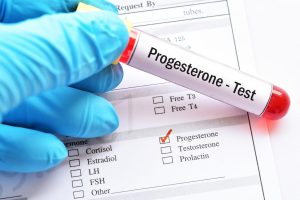Taking the Oral Contraceptive Pill Will not Cure Your PCOS

- Taking the pill can mask the symptoms of PCOS, not cure them.
- The pill is designed to prevent pregnancy.
- The pill does not regulate the menstrual cycle as regular ovulation does not occur.
- For women suffering discomfort with PCOS, the pill can help alleviate some symptoms but other options for treatment should be considered alongside it.
Following a diagnosis of PCOS, many women will be prescribed the combined oral contraceptive pill (‘the pill’). In theory, this sounds like a good idea; if PCOS is considered to be an endocrine system disorder, then regulating hormone levels should ease the symptoms.
What is the pill and why use it for PCOS?
The combined pill contains synthetic hormones: an oestrogen component that is anti-androgenic in nature and a progesterone component, which suppresses secretion of luteinising hormone. In combination this reduces some of the signs of hyperandrogenism, for example, acne and hirsutism, and, seemingly, regulates the menstrual cycle.
When should the pill not be prescribed for PCOS?
PCOS is one of the predominant causes of female infertility, thought to be responsible for up to 70% of cases. For those women experiencing PCOS-induced infertility, the pill is not an answer. By very definition, its main function is to prevent pregnancy. In addition to this, metabolic conditions, which are a common comorbidity alongside PCOS, can be exacerbated, or triggered by some versions of the combined oral contraceptive pill.
It is claimed that the pill helps to regulate the menstrual cycle, but this is not true. The monthly bleeds experienced by women taking the pill are withdrawal bleeds, not normal menstruation, so regular, cyclical ovulation is still not occurring. This can lead to disappointment for those women who have been taking the pill with the hope of regulating their cycles, so that upon withdrawal they can become pregnant. If they had irregular cycles before going on the pill, they are highly likely to revert back to a similar state once they stop taking it and find it equally difficult to conceive.
Furthermore, many specialists believe that current, or previous, use of the oral contraceptive pill, can even give rise to PCOS-like symptoms, which can cause women who have never had PCOS before to start experiencing some of the common complaints of the condition, including infertility. This is usually a transient condition, but can further hinder attempts to conceive.
Is there ever a time when the pill can help?
Taking all of this into account, it would be amiss to say that the pill is completely redundant in the treatment of PCOS. It does bring symptomatic relief to a lot of women, particularly those with heavily hyperandrogenic PCOS. As a means of birth control, it is one of the most widely used options available. It also appears to reduce the risk of developing endometrial cancer. Women with PCOS are up to three times more likely to be diagnosed with endometrial cancer, due to unopposed exposure of the uterus to oestrogen. Taking the pill could significantly reduce this risk.
Thus, the pill should not be disregarded as an option for treating PCOS, but doctors should be prepared to explore other options alongside, or in place of it, rather than seeing it as the treatment of choice for all patients.
To learn more about PCOS click here.
Nabta is reshaping women’s healthcare. We support women with their personal health journeys, from everyday wellbeing to the uniquely female experiences of fertility, pregnancy, and menopause.
Get in touch if you have any questions about this article or any aspect of women’s health. We’re here for you.
Sources:
- Azziz, R, et al. “Positions Statement: Criteria for Defining Polycystic Ovary Syndrome as a Predominantly Hyperandrogenic Syndrome: an Androgen Excess Society Guideline.” The Journal of Clinical Endocrinology and Metabolism, vol. 91, no. 11, Nov. 2006, pp. 4237–4245., doi:10.1210/jc.2006-0178. https://pubmed.ncbi.nlm.nih.gov/16940456/
- De Melo, A S, et al. “Hormonal Contraception in Women with Polycystic Ovary Syndrome: Choices, Challenges, and Noncontraceptive Benefits.” Open Access Journal of Contraception, vol. 8, 2 Feb. 2017, pp. 13–23., doi:10.2147/OAJC.S85543. https://www.ncbi.nlm.nih.gov/pmc/articles/PMC5774551/
- El Hayak, S, et al. “Poly Cystic Ovarian Syndrome: An Updated Overview.” Frontiers in Physiology, vol. 7, 5 Apr. 2016, p. 124., doi:10.3389/fphys.2016.00124. https://www.frontiersin.org/articles/10.3389/fphys.2016.00124/full
- Rotterdam ESHRE/ASRM-Sponsored PCOS Consensus Workshop Group. “Revised 2003 Consensus on Diagnostic Criteria and Long-Term Health Risks Related to Polycystic Ovary Syndrome.” Fertility and Sterility, vol. 81, no. 1, Jan. 2004, pp. 19–25. https://pubmed.ncbi.nlm.nih.gov/14711538/










